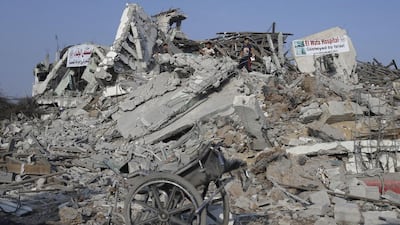Two years ago, my hospital was destroyed. It was the only dedicated rehabilitation hospital in Gaza, a modern centre of care with 80 beds, a therapeutic garden and state-of-the-art equipment. Our patients are among Gaza’s most vulnerable residents; many are paralysed, some need round-the-clock care.
In summer 2014, Gaza endured 51 days of attacks by Israel in which no place was safe, not even schools or hospitals. Soon after the attacks began, El Wafa, situated near the Shujaiyya neighbourhood in eastern Gaza, came under fire from Israeli shells and missiles.
On July 17, the hospital was struck, leading to a power cut and fires on several floors. We evacuated the patients under constant shelling and in the dark.
After several more days of strikes, on July 23, the hospital was completely destroyed in an Israeli air raid.
In the attack, we not only lost a critical lifeline for our patients, but also an investment of 30 years.
About $15 million (Dh55.1m) worth of equipment, gone in seconds.
Since then, we have set up a temporary care centre in a site we share with a geriatric hospital. Though our capacity is reduced, we continue to do everything we can to care for our patients.
One of our patients, Mohammed, 11, was injured during the war. He was paralysed completely when a bomb hit a family gathering, killing nine of his close relatives and severing his mother’s legs.
Mohammed needs 24-hour observation, and so must stay in the hospital, but nevertheless continues to thrive. We registered him in school, and he has passed his fourth grade exams and is now moving to the fifth grade. Teachers come to El Wafa to give him lessons in maths, science, Arabic, English and religion.
Mohammed’s recovery from the trauma of the attacks will be slow. A lack of international support, and Israel’s restrictions on the entry of building materials, mean that Gaza’s recovery has also been slow. In total, 17 hospitals and 56 health centres were damaged or destroyed, and more than 11,000 homes were lost. Two years on, El Wafa is still in ruins, and only 10 per cent of destroyed homes have been rebuilt.
El Wafa shares the struggles of all people in Gaza. We struggle to replace what was lost, we struggle to rebuild and we struggle for justice. Most of all, we struggle for freedom.
The blockadeaffects all aspects of medical care in Gaza. Medicines and equipment are difficult to procure. Even when we are able to source modern equipment through partnerships with international organisations, we often lack the training to use it effectively. This is because the blockade not only restricts the flow of goods and materials, it also restricts our most basic right to movement.
Patients struggle to get permits to travel outside for specialist treatment. Even when we have the right equipment inside Gaza, the blockade still holds us back from providing effective, modern care. We often cannot bring expert trainers in, or get our clinicians out to train in the latest medical techniques. This holds back the potential of Gaza’s dedicated medical professionals.
In El Wafa’s current temporary site, we have an oxygen therapy machine worth millions of dollars but it sits gathering dust as we are unable to train technicians to operate it.
With our hospital still in ruins, what hope is there for the future? Though we hope to rebuild, we cannot do so in the same place for fear of being attacked again. This is the third time that they targeted the hospital; we do not want to risk a fourth time. Human life is too precious.
Our only hope is to rebuild on a new site, but even this cannot guarantee our safety in Gaza. The prospect of new attacks hangs over us. When a hospital is destroyed and nobody is held accountable, there is no deterrent to it happening again. Justice is vital not only for the well-being of the victims but to prevent this from happening again.
Israel claims that El Wafa was used as a staging point for militants attacking their soldiers. But accountability is impossible when the accused is also the judge. Only an independent, international investigation can get to the truth of why our hospital was destroyed and provide justice for our patients and staff. Israel has strongly opposed this, even going so far as to bar UN investigators from accessing Gaza.
Until there is accountability, there will be no safe space in Gaza. Until the blockade is lifted, there will be no freedom for Palestinians. When will the world wake up to our plight?
Dr Basman Alashi is director of El Wafa Hospital in Gaza

